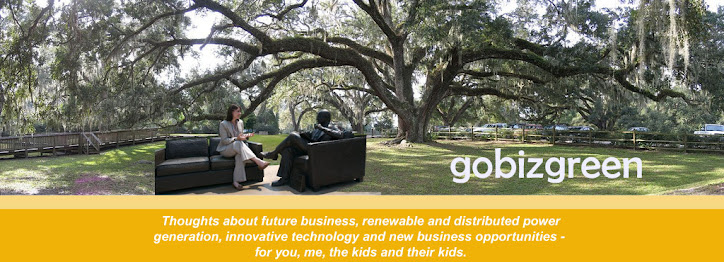Sunday 24 June 2007
Business as usual... but for how long?
Is this fiction or is it real? How long can we afford to continue without alternatives, how long can we continue with business as usual as if could not happen?
Wednesday 13 June 2007
To green or not to green..
Your observations were thoughtful and I think you have voiced a concern that many people have in terms of the cost factor, in particular that with change to renewable energy, your concern that “higher costs are inevitable”. In Australia, we do not want to reduce our standard of living, and very few of us want to go back to “living in small self sufficient communities as in medieval times”. I, for one, like the city life and my high tech gadgets!
My observations are that our lifestyles are best maintained by change to green energy earlier rather than later. Germany is doing this, and has made a huge commitment to renewable energy, and their economy is not just doing well, it is booming. My understanding is that the cost of electricity produced from wind farms is, at the moment, just slightly higher that that produced form coal fired power stations. If the emissions from coal fired stations were added and traded, then the cost of coal would be significantly higher. Or if the carbon produced was geo-sequestered, as is proposed, then this could add from 20% to 40% more to the cost of coal fired production of electricity. In terms of jobs, just like the computer industry, as many jobs lost in mining would be created, to build and maintain the wind and solar farms, and geothermal sites.
As you said, “we enjoy the benefits of electricity and profits from mining coal”, but if we continue to do this, it may well be at the expense of future generations. At some point, we need to make the change to renewable energy. Many professional and scientific minds in Australia and overseas believe that it is now economically feasible to begin this move, (initially to 25% renewables), and in fact, if we begin to export Aussie technology, it could well be a significant boost for the economy. Two hundred years ago, good people who had known no other system, did not see how they could run their farms without slaves. But it was possible, and took a war to change this mindset. We need a more peaceful transition to this new economy.
Monday 11 June 2007
Happy CHAPS
Great stuff, this sunshine. CHAPS (Combined Heat and Power Solar) uses lots of it to both heat water and produce electricity from the same unit. It's still in test mode, already operational at a residential complex at ANU in
Water Water everywhere, only coal to drink
It seems to me quite ironic that, just days after the approval of yet another coal mine for the Hunter region (Anvill Hill, NSW) the area is the sad recipient of a massive deluge and flood, with tragic loss of life and huge property damage to many households, farms and small businesses. I doubt if anyone could direct link the winds and record downpours of this storm to Climate Change, however, extreme weather such as was experienced this weekend is a major predicted outcome of Climate Change, which is, we are told by scientists, being driven by the burning of fossil fuels, in particular, coal and oil.
Whether this particular storm was more intense due to Climate Change is not the real question. The insurance industry has the statistics, and, overall, claims from storm damage are increasing globally, and so extremes of weather are occurring more often and with more intensity. And so we must ask ourselves whether coal mining and burning coal is something we should be continuing to do.
Our economy depends on electricity, and yes, that’s what I am using to write and send this post, make that coffee, to kick start the day, and have a warm shower. Life would be a bit drab without that wonderful stuff. But why coal to produce it? We are using a product that drives an antique industry (antique being defined as something over 100 years). As creative mammals on this planet, we now have an IT and cell phone industry that I for one find amazing. Yet our fossil fuel driven energy production industry is a dinosaur, a linear and, at times, an environmentally damaging industry. I’m not using a typewriter, or a quill pen to write this. I’m using a silicon based system that evolved over the past 20 years.
Actually, the technology for clean energy production, and here I mean wind, solar, and geothermal, is at the stage of the early PC, and experience in many other countries has shown that green energy production is now able to replace 20-30% of our current energy production methods. The brick-wall is simply the resistance to change and the lack of motivation to invest in new infrastructure. Perhaps the floods this weekend may motivate a few more people into thinking about overcoming that resistance.
Sunday 10 June 2007
GREX Expo - where are all the peeeeple?
For the past four years, I have run business development programs for Young Entrepreneurs, and I so often get asked about whats a great business idea. And I just point to three trends -
1. population - globally that's lots and lots more people to come,
2. technology - always look to new ideas
3. climate change - its the biggest trend and if you combine all three trends, then there's where the new emerging (and money making opportunities are) - and G-Rex was about trend 2 and 3. So where were all the people that ask me that question?


